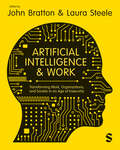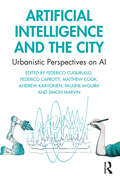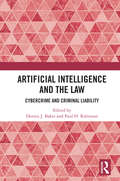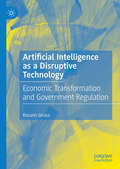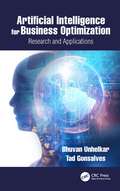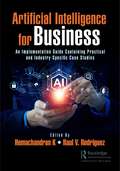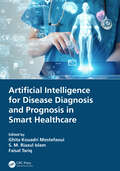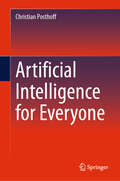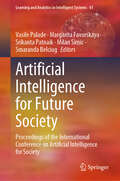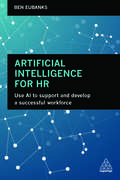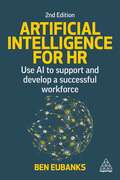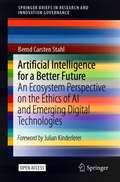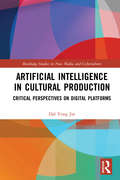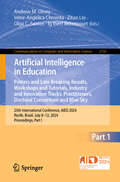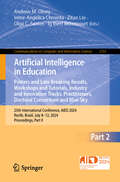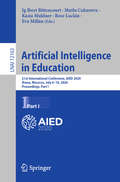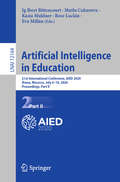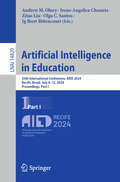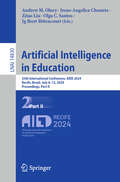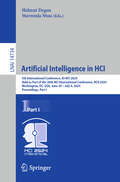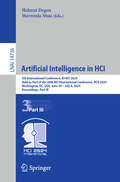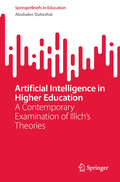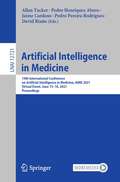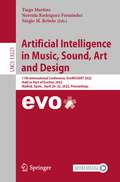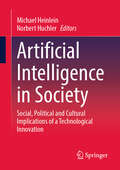- Table View
- List View
Artificial Intelligence and Work: Transforming Work, Organizations, and Society in an Age of Insecurity
by John Bratton Laura SteeleIn an era marked by insecurity from neoliberalism, financial volatility, political instability, regional conflicts, pandemics, and the climate crisis, Artificial Intelligence (AI) is revolutionizing our work, organizations, societies, and the environment. This critical text explores who truly benefits from AI′s development and deployment, offering a comprehensive overview of AI′s nature, history, and applications. It delves into crucial themes such as the future of work, digitalization, neoliberalism′s impact, power dynamics, ethics, inequality, gender, race, intersectional discrimination, and environmental sustainability. Unlike practical machine learning guides, this book examines how AI and AI-based technologies are transforming work, highlighting both benefits and potential harms. Combining critical management and leadership studies with organizational sociology, it addresses societal implications, inequality, ethics, and power often overlooked by other textbooks. John Bratton′s lucid and engaging writing style brings a cutting-edge subject to life, blending breadth, critical analysis, and academic rigor. Contemporary examples illustrate AI′s real-life implications for organizations and work today, while thought-provoking questions encourage readers to engage with and reflect on the topics throughout. Authored by John Bratton, an Honorary Professor at Queen’s University Belfast, and Laura Steele, a Senior Lecturer in Business and Society at Queen’s University Belfast, this interdisciplinary text is essential for students studying contemporary and emerging issues in business and management, including AI, business analytics, digitalization, and the future of work. It is also recommended for courses on the sociology of work, ethics, organization studies, management, leadership, and HRM. This book is poised to become an essential textbook for courses on AI, digitalization, and the future of work, making it a valuable resource for students and educators alike.
Artificial Intelligence and the City: Urbanistic Perspectives on AI
by Matthew Cook Federico Caprotti Simon Marvin Andrew Karvonen Federico Cugurullo Pauline McGuirkThis book explores in theory and practice how artificial intelligence (AI) intersects with and alters the city. Drawing upon a range of urban disciplines and case studies, the chapters reveal the multitude of repercussions that AI is having on urban society, urban infrastructure, urban governance, urban planning and urban sustainability. Contributors also examine how the city, far from being a passive recipient of new technologies, is influencing and reframing AI through subtle processes of co-constitution. The book advances three main contributions and arguments: First, it provides empirical evidence of the emergence of a post-smart trajectory for cities in which new material and decision-making capabilities are being assembled through multiple AIs. Second, it stresses the importance of understanding the mutually constitutive relations between the new experiences enabled by AI technology and the urban context. Third, it engages with the concepts required to clarify the opaque relations that exist between AI and the city, as well as how to make sense of these relations from a theoretical perspective. Artificial Intelligence and the City offers a state-of-the-art analysis and review of AI urbanism, from its roots to its global emergence. It cuts across several disciplines and will be a useful resource for undergraduates and postgraduates in the fields of urban studies, urban planning, geography, architecture, urban design, science and technology studies, sociology and politics.
Artificial Intelligence and the Law: Cybercrime and Criminal Liability
by Dennis J. Baker Paul H. RobinsonThis volume presents new research in artificial intelligence (AI) and Law with special reference to criminal justice. It brings together leading international experts including computer scientists, lawyers, judges and cyber-psychologists. The book examines some of the core problems that technology raises for criminal law ranging from privacy and data protection, to cyber-warfare, through to the theft of virtual property. Focusing on the West and China, the work considers the issue of AI and the Law in a comparative context presenting the research from a cross-jurisdictional and cross-disciplinary approach. As China becomes a global leader in AI and technology, the book provides an essential in-depth understanding of domestic laws in both Western jurisdictions and China on criminal liability for cybercrime. As such, it will be a valuable resource for academics and researchers working in the areas of AI, technology and criminal justice.
Artificial Intelligence as a Disruptive Technology: Economic Transformation and Government Regulation
by Rosario GirasaArtificial intelligence (AI) is the latest technological evolution which is transforming the global economy and is a major part of the “Fourth Industrial Revolution.” This book covers the meaning, types, subfields and applications of AI, including U.S. governmental policies and regulations, ethical and privacy issues, particularly as they pertain and affect facial recognition programs and the Internet-of Things (IoT). There is a lengthy analysis of bias, AI’s effect on the current and future job market, and how AI precipitated fake news. In addition, the text covers basics of intellectual property rights and how AI will transform their protection. The author then moves on to explore international initiatives from the European Union, China’s New Generation Development Plan, other regional areas, and international conventions. The book concludes with a discussion of super intelligence and the question and applicability of consciousness in machines. The interdisciplinary scope of the text will appeal to any scholars, students and general readers interested in the effects of AI on our society, particularly in the fields of STS, economics, law and politics.
Artificial Intelligence for Business Optimization: Research and Applications
by Bhuvan Unhelkar Tad GonsalvesThis is primarily a business book that discusses the research and associated practical application of artificial intelligence (AI) and machine learning (ML) in order to achieve business optimization (BO). AI comprises a wide range of technologies, databases, algorithms, and devices. This book aims for a holistic approach to AI by focusing on developing business strategies that will not only automate but also optimize business functions, processes, and people’s behaviors. Artificial Intelligence for Business Optimization: Research and Applications explores AI and ML from a business viewpoint with the key purpose of enhancing customer value. It applies research methods and fundamentals from a practitioner’s viewpoint and incorporates discussions around risks and changes associated with the utilization of AI in business. Furthermore, governance risks, privacy, and security are also addressed in this book to ensure compliance with AI/ML applications. Readers should find direct and practical applications of the discussions in this book quite useful in their work environment. Researchers will find many ideas to further explore the applications of AI to business.
Artificial Intelligence for Business: An Implementation Guide Containing Practical and Industry-Specific Case Studies
by Raul V. Rodriguez K HemachandranArtificial intelligence (AI) is transforming the business world at an unprecedented pace. From automating mundane tasks to predicting consumer behaviour, AI is changing the way businesses operate across all sectors. This book is an exploration of AI in business applications, highlighting the diverse range of ways in which AI is being used across different industries. The book begins with an overview of AI in business and its impact on the workforce. It then explores the role of AI in marketing, advertising, and tourism. The use of AI in personalized recommendations and chatbots is discussed in detail. The book then moves on to examine how AI is changing the retail industry, improving supply chain management, and enhancing the customer experience. The media and entertainment industry is also examined, with a focus on how AI is being used to personalize content and improve the user experience. The book also explores the use of AI in human resources, insurance, legal, and finance. The impact of AI on talent identification, recruitment, underwriting, document analysis, and financial forecasting is discussed in detail. In the healthcare and sports industries, AI is transforming the way we approach diagnosis, treatment, and training. The book examines how AI is being used to analyse medical images, develop personalized treatment plans, and improve patient outcomes. The use of AI in sports performance analysis is also discussed in detail. Finally, the book explores the use of AI in agriculture, energy, education, and the public sector. The potential of AI to optimize crop yields, reduce energy consumption, and improve the quality of education is discussed in detail. The book also examines how AI is being used to improve public services, such as transportation and emergency services. This book is a valuable resource for academics, researchers, professionals, and policymakers who are interested in understanding the potential of AI in the business world. The contributions from leading experts and researchers provide a comprehensive overview of AI in business applications, and how it is transforming different sectors. The book also examines the ethical dilemmas that arise from the use of AI in business, such as the impact on privacy and data security, and the potential for bias in AI algorithms. It provides valuable insights into how businesses can ensure that the use of AI is ethical and responsible. In conclusion, this book is a must-read for anyone interested in the potential of AI in the business world. It provides a comprehensive overview of AI in business applications and how it is transforming different sectors. The book examines the ethical dilemmas that arise from the use of AI in business, providing valuable insights into how businesses can ensure that the use of AI is ethical and responsible. We hope that readers will find this book informative and thought-provoking.
Artificial Intelligence for Disease Diagnosis and Prognosis in Smart Healthcare
by Faisal Tariq Ghita Kouadri Mostefaoui Islam, S. M. RiazulArtificial Intelligence (AI) in general and machine learning (ML) and deep learning (DL) in particular and related digital technologies are a couple of fledging paradigms that next-generation healthcare services are sprinting towards. These digital technologies can transform various aspects of healthcare, leveraging advances in computing and communication power. With a new spectrum of business opportunities, AI-powered healthcare services will improve the lives of patients, their families, and societies. However, the application of AI in the healthcare field requires special attention given the direct implication with human life and well-being. Rapid progress in AI leads to the possibility of exploiting healthcare data for designing practical tools for automated diagnosis of chronic diseases such as dementia and diabetes. This book highlights the current research trends in applying AI models in various disease diagnoses and prognoses to provide enhanced healthcare solutions. The primary audience of the book are postgraduate students and researchers in the broad domain of healthcare technologies. Features In-depth coverage of the role of AI in smart healthcare Research guidelines for AI and data science researchers/practitioners interested in the healthcare sector Comprehensive coverage on security and privacy issues for AI in smart healthcare
Artificial Intelligence for Everyone
by Christian PosthoffThis book demystifies the topic of Artificial Intelligence for readers of varying backgrounds. The content should enable many people to discuss and follow ongoing developments in an informed way, to draw conclusions for their own life and workplace and to acquire the necessary new knowledge. The book strives to provide basic knowledge that will objectify the discussions and relieve some of the creepiness of utopian films. It must also be understood that research results are a necessary condition for progress; they are not sufficient until they can be translated into practice embedded in programs. This difficult relationship between theory and practice has been known for a long time.
Artificial Intelligence for Future Society: Proceedings of the International Conference on Artificial Intelligence for Society (Learning and Analytics in Intelligent Systems #41)
by Vasile Palade Srikanta Patnaik Margarita Favorskaya Smaranda Belciug Milan Simic"Artificial Intelligence for Future Society" presents the revolution in future societies by enhancing efficiency, connectivity, and personalization across various sectors. Its future aspects include the integration of AI in everyday life through smart cities, autonomous vehicles, and advanced healthcare systems, providing a more intelligent, responsive, and adaptive environment that meets the evolving needs of humanity. This volume explores the most recent innovations and significant developments in the domains of Artificial Intelligence and its impact in transforming society, propelling innovation across diverse fields such as healthcare, education, finance, and transportation. It spans a wide range of dimensions, including: Societal Diversity Innovation in the Digital Age Business Information Systems Advancement in Healthcare, HSI, and Global Collaboration By merging cutting-edge theoretical insights with practical applications, this volume provides researchers, practitioners, and students with the essential knowledge and tools to explore and advance within the dynamic field of Artificial Intelligence. Artificial Intelligence brings numerous benefits to society, including improved efficiency and productivity in various industries through automation and intelligent data analysis. It enhances healthcare with advanced diagnostic tools and personalized treatment plans, and provides smarter living environments through smart cities and innovative technologies.
Artificial Intelligence for HR: Use AI to Support and Develop a Successful Workforce
by Ben EubanksHR professionals need to get to grips with artificial intelligence and the way it's changing the world of work. From using natural language processing to ensure job adverts are free from bias and gendered language to implementing chatbots to enhance the employee experience, AI has created a variety of opportunities for the HR function. Artificial Intelligence for HR empowers HR professionals to leverage this potential and use AI to improve efficiency and develop a talented and productive workforce. Outlining the current technology landscape as well as the latest AI developments, this book ensures that HR professionals fully understand what AI is and what it means for HR in practice.Covering everything from recruitment and retention to employee engagement and learning and development, Artificial Intelligence for HR outlines the value AI can add to HR. It also features discussions on the challenges that can arise from AI and how to deal with them, including data privacy, algorithmic bias and how to develop the skills of a workforce with the rise of automation, robotics and machine learning in order to make it more human, not less. Packed with practical advice, research and case studies from global organizations including Uber, IBM and Unilever, this book will equip HR professionals with the knowledge they need to leverage AI to recruit and develop a successful workforce and help their businesses thrive in the future.
Artificial Intelligence for HR: Use AI to Support and Develop a Successful Workforce
by Ben EubanksArtificial intelligence is changing the world of work. How can HR professionals understand the variety of opportunities AI has created for the HR function and how best to implement these in their organization? This book provides the answers.From using natural language processing to ensure job adverts are free from bias and gendered language to implementing chatbots to enhance the employee experience, artificial intelligence can add value throughout the work of HR professionals. Artificial Intelligence for HR demonstrates how to leverage this potential and use AI to improve efficiency and develop a talented and productive workforce. Outlining the current technology landscape as well as the latest AI developments, this book ensures that HR professionals fully understand what AI is and what it means for HR in practice.Alongside coverage of employee engagement and recruitment, this second edition features new material on applications of AI for virtual work, reskilling and data integrity. Packed with practical advice, research and new and updated case studies from global organizations including Uber, IBM and Unilever, the second edition of Artificial Intelligence for HR will equip HR professionals with the knowledge they need to improve people operational efficiencies, and allow AI solutions to become enhancements for driving business success.
Artificial Intelligence for a Better Future: An Ecosystem Perspective on the Ethics of AI and Emerging Digital Technologies (SpringerBriefs in Research and Innovation Governance)
by Bernd Carsten StahlThis open access book proposes a novel approach to Artificial Intelligence (AI) ethics. AI offers many advantages: better and faster medical diagnoses, improved business processes and efficiency, and the automation of boring work. But undesirable and ethically problematic consequences are possible too: biases and discrimination, breaches of privacy and security, and societal distortions such as unemployment, economic exploitation and weakened democratic processes. There is even a prospect, ultimately, of super-intelligent machines replacing humans. The key question, then, is: how can we benefit from AI while addressing its ethical problems?This book presents an innovative answer to the question by presenting a different perspective on AI and its ethical consequences. Instead of looking at individual AI techniques, applications or ethical issues, we can understand AI as a system of ecosystems, consisting of numerous interdependent technologies, applications and stakeholders. Developing this idea, the book explores how AI ecosystems can be shaped to foster human flourishing. Drawing on rich empirical insights and detailed conceptual analysis, it suggests practical measures to ensure that AI is used to make the world a better place.
Artificial Intelligence in Cultural Production: Critical Perspectives on Digital Platforms (Routledge Studies in New Media and Cyberculture)
by Dal Yong JinThis book offers an in-depth academic discourse on the convergence of AI, digital platforms, and popular culture, in order to understand the ways in which the platform and cultural industries have reshaped and developed AI-driven algorithmic cultural production and consumption. At a time of fundamental change for the media and cultural industries, driven by the emergence of big data, algorithms, and AI, the book examines how media ecology and popular culture are evolving to serve the needs of both media and cultural industries and consumers. The analysis documents global governments’ rapid development of AI-relevant policies and identifies key policy issues; examines the ways in which cultural industries firms utilize AI and algorithms to advance the new forms of cultural production and distribution; investigates change in cultural consumption by analyzing the ways in which AI, algorithms, and digital platforms reshape people’s consumption habits; and examines whether governments and corporations have advanced reliable public and corporate policies and ethical codes to secure socio-economic equality. Offering a unique perspective on this timely and vital issue, this book will be of interest to scholars and students in media studies, communication studies, anthropology, globalization studies, sociology, cultural studies, Asian studies, and science and technology studies (STS).
Artificial Intelligence in Education. Posters and Late Breaking Results, Workshops and Tutorials, Industry and Innovation Tracks, Practitioners, Doctoral Consortium and Blue Sky: 25th International Conference, AIED 2024, Recife, Brazil, July 8–12, 2024, Proceedings, Part I (Communications in Computer and Information Science #2150)
by Olga C. Santos Ig Ibert Bittencourt Irene-Angelica Chounta Andrew M. Olney Zitao LiuThis volume constitutes poster papers and late breaking results presented during the 25th International Conference on Artificial Intelligence in Education, AIED 2024, which took place in Recife, Brazil, during July 8–12, 2024. The 18 full papers and 92 short papers were carefully reviewed and selected from 200 submissions. They are organized in topical sections as follows: Part One: Blue Sky, Industry, Innovation and Practitioner, WideAIED and Late-Breaking Results. Part Two: Late-Breaking Results, Doctoral Consortium, Workshops and Tutorials.
Artificial Intelligence in Education. Posters and Late Breaking Results, Workshops and Tutorials, Industry and Innovation Tracks, Practitioners, Doctoral Consortium and Blue Sky: 25th International Conference, AIED 2024, Recife, Brazil, July 8–12, 2024, Proceedings, Part II (Communications in Computer and Information Science #2151)
by Olga C. Santos Ig Ibert Bittencourt Irene-Angelica Chounta Andrew M. Olney Zitao LiuThis volume constitutes poster papers and late breaking results presented during the 25th International Conference on Artificial Intelligence in Education, AIED 2024, which took place in Recife, Brazil, during July 8–12, 2024. The 18 full papers and 92 short papers were carefully reviewed and selected from 200 submissions. They are organized in topical sections as follows: Part One: Blue Sky, Industry, Innovation and Practitioner, WideAIED and Late-Breaking Results. Part Two: Late-Breaking Results, Doctoral Consortium, Workshops and Tutorials.
Artificial Intelligence in Education: 21st International Conference, AIED 2020, Ifrane, Morocco, July 6–10, 2020, Proceedings, Part I (Lecture Notes in Computer Science #12163)
by Rose Luckin Ig Ibert Bittencourt Eva Millán Mutlu Cukurova Kasia MuldnerThis two-volume set LNAI 12163 and 12164 constitutes the refereed proceedings of the 21th International Conference on Artificial Intelligence in Education, AIED 2020, held in Ifrane, Morocco, in July 2020.*The 49 full papers presented together with 66 short, 4 industry & innovation, 4 doctoral consortium, and 4 workshop papers were carefully reviewed and selected from 214 submissions. The conference provides opportunities for the cross-fertilization of approaches, techniques and ideas from the many fields that comprise AIED, including computer science, cognitive and learning sciences, education, game design, psychology, sociology, linguistics as well as many domain-specific areas. *The conference was held virtually due to the COVID-19 pandemic.
Artificial Intelligence in Education: 21st International Conference, AIED 2020, Ifrane, Morocco, July 6–10, 2020, Proceedings, Part II (Lecture Notes in Computer Science #12164)
by Rose Luckin Ig Ibert Bittencourt Eva Millán Mutlu Cukurova Kasia MuldnerThis two-volume set LNAI 12163 and 12164 constitutes the refereed proceedings of the 21th International Conference on Artificial Intelligence in Education, AIED 2020, held in Ifrane, Morocco, in July 2020.* The 49 full papers presented together with 66 short, 4 industry & innovation, 4 doctoral consortium, and 4 workshop papers were carefully reviewed and selected from 214 submissions. The conference provides opportunities for the cross-fertilization of approaches, techniques and ideas from the many fields that comprise AIED, including computer science, cognitive and learning sciences, education, game design, psychology, sociology, linguistics as well as many domain-specific areas. *The conference was held virtually due to the COVID-19 pandemic.
Artificial Intelligence in Education: 25th International Conference, AIED 2024, Recife, Brazil, July 8–12, 2024, Proceedings, Part I (Lecture Notes in Computer Science #14829)
by Olga C. Santos Ig Ibert Bittencourt Irene-Angelica Chounta Andrew M. Olney Zitao LiuThis book constitutes the refereed proceedings of the 25th International Conference on Artificial Intelligence in Education, AIED 2024, held in Recife, Brazil, in July 8–12, 2024, Proceedings. The 49 full papers and 27 short papers presented in this book were carefully reviewed and selected from 334 submissions. The papers present results in high-quality research on intelligent systems and the cognitive sciences for the improvement and advancement of education.
Artificial Intelligence in Education: 25th International Conference, AIED 2024, Recife, Brazil, July 8–12, 2024, Proceedings, Part II (Lecture Notes in Computer Science #14830)
by Olga C. Santos Ig Ibert Bittencourt Irene-Angelica Chounta Andrew M. Olney Zitao LiuThis book constitutes the refereed proceedings of the 25th International Conference on Artificial Intelligence in Education, AIED 2024, held in Recife, Brazil, in July 8–12, 2024, Proceedings. The 49 full papers and 27 short papers presented in this book were carefully reviewed and selected from 334 submissions. The papers present result in high-quality research on intelligent systems and the cognitive sciences for the improvement and advancement of education.
Artificial Intelligence in HCI: 5th International Conference, AI-HCI 2024, Held as Part of the 26th HCI International Conference, HCII 2024, Washington, DC, USA, June 29 – July 4, 2024, Proceedings, Part I (Lecture Notes in Computer Science #14734)
by Helmut Degen Stavroula NtoaThe three-volume book set LNAI 14734, 14735, and 14736 constitutes the refereed proceedings of 5th International Conference on Artificial Intelligence in HCI, AI-HCI 2024, held as part of the 26th International Conference, HCI International 2024, which took place in Washington, DC, USA, during June 29-July 4, 2024. The total of 1271 papers and 309 posters included in the HCII 2024 proceedings was carefully reviewed and selected from 5108 submissions. The AI-HCI 2024 proceedings were organized in the following topical sections: Part I: Human-centered artificial intelligence; explainability and transparency; AI systems and frameworks in HCI; Part II: Ethical considerations and trust in AI; enhancing user experience through AI-driven technologies; AI in industry and operations; Part III: Large language models for enhanced interaction; advancing human-robot interaction through AI; AI applications for social impact and human wellbeing.
Artificial Intelligence in HCI: 5th International Conference, AI-HCI 2024, Held as Part of the 26th HCI International Conference, HCII 2024, Washington, DC, USA, June 29–July 4, 2024, Proceedings, Part III (Lecture Notes in Computer Science #14736)
by Helmut Degen Stavroula NtoaThe three-volume book set LNAI 14734, 14735, and 14736 constitutes the refereed proceedings of 5th International Conference on Artificial Intelligence in HCI, AI-HCI 2024, held as part of the 26th International Conference, HCI International 2024, which took place in Washington, DC, USA, during June 29-July 4, 2024. The total of 1271 papers and 309 posters included in the HCII 2024 proceedings was carefully reviewed and selected from 5108 submissions. The AI-HCI 2024 proceedings were organized in the following topical sections: Part I: Human-centered artificial intelligence; explainability and transparency; AI systems and frameworks in HCI; Part II: Ethical considerations and trust in AI; enhancing user experience through AI-driven technologies; AI in industry and operations; Part III: Large language models for enhanced interaction; advancing human-robot interaction through AI; AI applications for social impact and human wellbeing.
Artificial Intelligence in Higher Education: A Contemporary Examination of Illich's Theories (SpringerBriefs in Education)
by Abubaker QutieshatThis book is multi-dimensional exploration of Ivan Illich's critique of institutionalized education. It dissects, analyzes, and understands the implications of his critique for the future of education in a world increasingly influenced by technology, particularly artificial intelligence (AI). The book outlines the problems with current educational systems and discusses potential alternatives, considering the role of modern technology like AI. It employs a multi-disciplinary approach, incorporating historical analysis, philosophical inquiry, and practical considerations to explore Illich's critique. Readers will be equipped with the knowledge to critically assess the educational landscape and consider viable alternatives for reform. This book contributes to the field of educational theory and practice in its nuanced understanding of Illich's critique and its implications for educational reform. It serves as both a theoretical exploration and a practical guide, making it a valuable resource for a wide range of readers, including educators, policymakers, students, and anyone interested in the future of education.
Artificial Intelligence in Medicine: 19th International Conference on Artificial Intelligence in Medicine, AIME 2021, Virtual Event, June 15–18, 2021, Proceedings (Lecture Notes in Computer Science #12721)
by Jaime Cardoso David Riaño Allan Tucker Pedro Henriques Abreu Pedro Pereira RodriguesThis book constitutes the refereed proceedings of the 19th International Conference on Artificial Intelligence in Medicine, AIME 2021, held as a virtual event, in June 2021. The 28 full papers presented together with 30 short papers were selected from 138 submissions. The papers are grouped in topical sections on image analysis; predictive modelling; temporal data analysis; unsupervised learning; planning and decision support; deep learning; natural language processing; and knowledge representation and rule mining.
Artificial Intelligence in Music, Sound, Art and Design: 11th International Conference, EvoMUSART 2022, Held as Part of EvoStar 2022, Madrid, Spain, April 20–22, 2022, Proceedings (Lecture Notes in Computer Science #13221)
by Tiago Martins Nereida Rodríguez-Fernández Sérgio M. RebeloThis book constitutes the refereed proceedings of the 10th European Conference on Artificial Intelligence in Music, Sound, Art and Design, EvoMUSART 2022, held as part of Evo* 2022, in April 2022, co-located with the Evo* 2022 events, EvoCOP, EvoApplications, and EuroGP. The 20 full papers and 6 short papers presented in this book were carefully reviewed and selected from 66 submissions. They cover a wide range of topics and application areas, including generative approaches to music and visual art, deep learning, and architecture.
Artificial Intelligence in Society: Social, Political and Cultural Implications of a Technological Innovation
by Michael Heinlein Norbert HuchlerArtificial Intelligence (AI) represents a key technology for social change in the 21st century. Numerous technological applications are now in use that are based on machine learning and the associated possibilities for data collection, use and exploitation. By making large amounts of data manageable and hidden patterns and connections visible, AI makes many things faster, easier and more efficient - be it in everyday life, at work or in organizations. However, the question remains open as to what profound and sometimes latent consequences for humans as social beings and social coexistence are associated with the use and development of AI. How is the relationship between people and technology changing through AI and how should this change be assessed? What opportunities and risks do the use and development of AI open up for people and society? What are the limits of change and what design options are available? And last but not least: What and who determines the development paths that AI takes - with what consequences and for whom? Some of the articles in this volume have been automatically translated into English by Springer (machine translation by the service DeepL.com). The contributions were then thoroughly revised, corrected and supplemented by the authors. The authors are therefore responsible not only for the content, but also for the linguistic form of the articles. Nevertheless, the text of the book may differ stylistically from a conventional translation.
